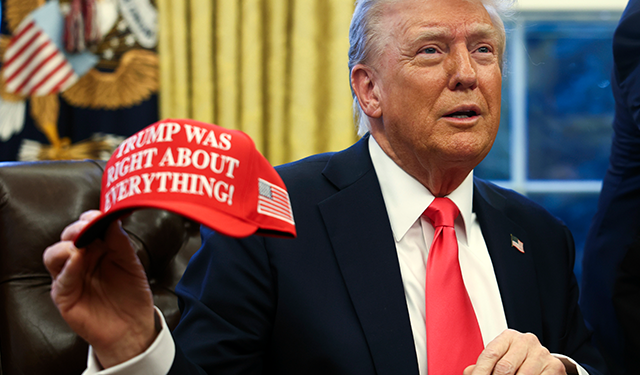It’s a favorite talking point of the anti-Trump crowd: tariffs cause inflation. This claim has spread like wildfire among economists and media pundits who refuse to acknowledge the evidence staring them in the face. The latest to push this narrative? Norbert Michel and Jai Kedia of the Cato Institute, who argue that tariffs shrink the supply of goods, drive up prices, and therefore cause inflation. But their argument is more about ideological opposition to tariffs than sound economic reasoning.
Larry Kudlow, former economic advisor to President Trump and current Fox Business host, recently tackled this issue head-on, explaining that inflation is a monetary phenomenon, not the result of targeted tariffs. Unsurprisingly, the Cato duo took issue with this, but their rebuttal falls apart under scrutiny. Let’s break it down.
Inflation vs. Price Adjustments
Kudlow’s central point is that inflation and price changes are not the same thing. A tariff may raise the price of a specific product, but that doesn’t mean it drives up the cost of everything. When one price rises, consumers often cut back spending elsewhere, putting downward pressure on other prices. Tariffs shift prices around within the economy; they do not create broad-based, sustained inflation.
Here’s how Kudlow explained it:
“If the price of a washing machine goes up because of a tariff, and a family buys it anyway at the higher price, that means they have less money to spend on other items. The washing machine price will go up, but some other price or prices will go down. It might mean that family won’t buy a television set, or a computer, or something else. So, one price goes up, families have less to spend on another good, and that other price goes down.”
Even studies by the Federal Reserve and the National Bureau of Economic Research (NBER) confirm that Trump-era tariffs had minimal impact on overall inflation. Inflation during Trump’s first term was typically below the Federal Reserve’s 2% target. This aligns with Kudlow’s point that tariffs alter relative prices but do not drive economy-wide inflation.
Tariffs Are Not Broad Supply Shocks
Michel and Kedia argue that broad-based tariffs could cause inflation by reducing supply. But even the broadest tariffs only affect a small fraction of the goods that make up the Consumer Price Index (CPI). Only about 15% of consumer spending goes toward imported goods. So even if every single import were hit with a tariff, the impact on overall prices would be limited.
Cato’s argument also wrongly equates tariffs with true supply shocks, such as oil embargoes or natural disasters, which reduce production capacity across an entire economy. Tariffs do no such thing. Instead, they shift demand from foreign suppliers to domestic producers or alternative trading partners. Global supply isn’t destroyed—it’s redistributed.
Even when tariffs cause temporary disruptions, market economies adjust. New supply chains emerge, production relocates, and prices stabilize. The claim that tariffs create lasting inflation ignores this basic economic reality.
Tariff Revenue Stays Home
Another critical distinction between tariffs and supply shocks is what happens to the money. When oil prices rise due to an embargo, all the extra money spent on oil flows out of the country. With tariffs, however, the revenue goes straight into the U.S. Treasury. That money can then be used to reduce deficits, fund infrastructure, or even cut taxes—all of which counteract inflationary effects. Cato ignores this crucial difference.
Michel and Kedia also try to claim Kudlow misunderstands monetary policy. Their argument? Inflation isn’t just about money supply because the Federal Reserve doesn’t “print money” directly. But this is a straw man argument.
While the Fed doesn’t literally print cash, it creates money by manipulating interest rates and encouraging bank lending. Lower interest rates lead to more borrowing, which expands the money supply. This is why Milton Friedman’s famous saying still holds: “Inflation is always and everywhere a monetary phenomenon.”
The bottom line? If the money supply isn’t expanding, then tariffs—even broad ones—cannot drive overall inflation. Kudlow understands this. Cato should, too.
Cato also throws in a last-ditch effort to claim that tariffs must cause inflation by reducing economic output. But this ignores two key realities:
- Tariffs Do Not Reduce Output: Tariffs don’t destroy production—they shift it. The economy continues functioning, just with different suppliers.
- The Velocity of Money Adjusts: If consumers spend more on one item due to tariffs, they spend less elsewhere, slowing price increases in other areas. Inflation requires a sustained increase in money movement across all sectors, not just price shifts within a small portion of the economy.
At the end of the day, Cato’s argument falls apart because it confuses localized price shifts with broad inflation. Tariffs may make some goods more expensive, but they do not create a monetary explosion. Inflation is a monetary issue, not a tariff issue.
Larry Kudlow is right: tariffs do not cause inflation. The Cato Institute should stop chasing economic ghosts and start recognizing the real problem—reckless monetary policy and runaway government spending.




















